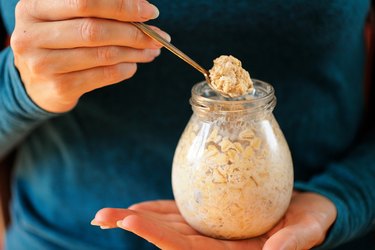
Following the ketogenic diet can be a good way to lose weight and burn fat more effectively. It's a low carb, high fat diet that actually alters the metabolic processes in your body, and with practice, it's relatively simple to follow. But not all of keto's side effects are positive, and it's important to be aware of when it might be causing problems for your health.
If you're worried that keto is affecting your period or causing weight gain, it's best to take a step back and evaluate whether the diet is working for you. While keto could cause a late period, it's not the only thing that affects your menstrual cycle, so it's important to figure out the root cause before seeking a solution.
Video of the Day
Video of the Day
Read more: Symptoms Your Period Is Coming Soon
Avoid Keto Side Effects
The purpose of the keto diet is to train your body to burn fat as fuel rather than burning carbohydrates. People on the keto diet typically eat less than 50 grams of carbohydrates daily, replacing those calories with healthy fats and protein. After a short time (usually a few days), blood ketone levels will rise, indicating that the body has gone into ketosis.
The reason ketosis is so popular for weight loss is that the body is burning its own fat to use as fuel. However, ketosis comes with unfavorable side effects if you aren't carefully monitoring your body's reaction.
Read more: 6 Keto Diet Mistakes to Avoid at All Costs
Monitor Your Caloric Intake
In a September 2014 study published in the Journal of Endocrinological Investigation, researchers found that functional hypothalamic amenorrhea (FHA) — the absence of periods due to stress, weight loss or excessive exercise — has a significant negative impact on a woman's body. When your period stops, it's the sign of a deeper problem with your hormonal cycle, and it can have long-term effects on your fertility and your overall health.
One common sign of FHA is excessive calorie restriction, which can happen accidentally if you've limited your carb intake without adding other nutrients to your diet. Make sure you are replacing carbohydrates with healthy fats and protein and eating a variety of nutrient-dense foods. It may be helpful to keep a food journal for a few months or use a calorie counting app as you are transitioning into your new way of eating; this will ensure you are getting all the fuel your body needs to function well.
Is Keto to Blame?
Still worried that keto is causing your late period, or making it disappear altogether? If you're eating enough calories, diversifying nutrients and still experiencing keto weight gain and period issues, it might be a sign that your hormone levels are out of whack.
Certain hormones, like leptin, are crucial for maintaining a healthy menstrual cycle. The research on how ketosis affects these hormones is still new, and there is no definitive conclusion that the keto diet affects everyone the same way. If you're concerned about hormone imbalances that might be caused by your diet, talk to your doctor about getting your levels tested. This will help you know for sure whether your keto diet might be the culprit.
- Health.Harvard.edu: "Should You Try The Keto Diet?"
- PubMed Central: "Nutritional Ketosis and Mitohormesis: Potential Implications for Mitochondrial Function and Human Health"
- PubMed Central: "Functional Hypothalamic Amenorrhea and Its Influence on Women’s Health"
- PubMed Central: "Serum Leptin Levels and Reproductive Function During the Menstrual Cycle"